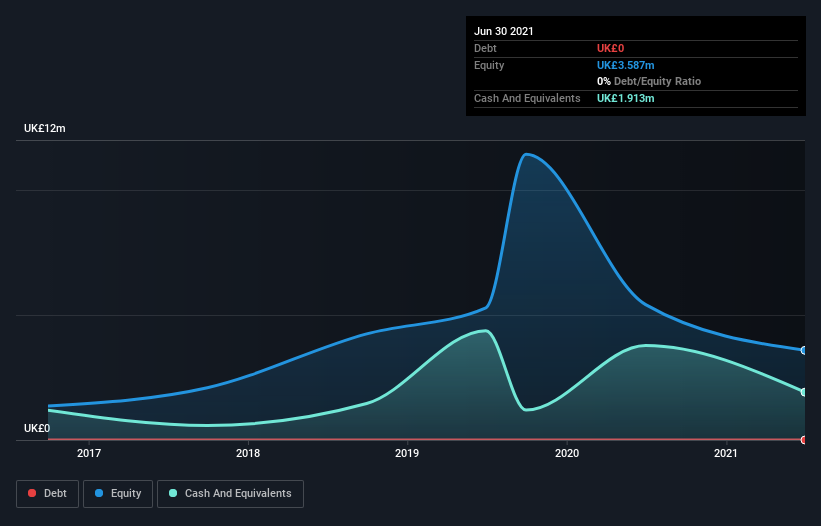
Just because a business does not make any money, does not mean that the stock will go down. For example, although Amazon.com made losses for many years after listing, if you had bought and held the shares since 1999, you would have made a fortune. But while history lauds those rare successes, those that fail are often forgotten; who remembers Pets.com?
So should Gelion (LON:GELN) shareholders be worried about its cash burn? In this report, we will consider the company's annual negative free cash flow, henceforth referring to it as the 'cash burn'. We'll start by comparing its cash burn with its cash reserves in order to calculate its cash runway.
See our latest analysis for Gelion
When Might Gelion Run Out Of Money?
A company's cash runway is the amount of time it would take to burn through its cash reserves at its current cash burn rate. As at June 2021, Gelion had cash of UK£1.9m and no debt. Looking at the last year, the company burnt through UK£1.7m. Therefore, from June 2021 it had roughly 14 months of cash runway. While that cash runway isn't too concerning, sensible holders would be peering into the distance, and considering what happens if the company runs out of cash. Depicted below, you can see how its cash holdings have changed over time.

How Is Gelion's Cash Burn Changing Over Time?
Although Gelion had revenue of UK£351k in the last twelve months, its operating revenue was only UK£351k in that time period. Given how low that operating leverage is, we think it's too early to put much weight on the revenue growth, so we'll focus on how the cash burn is changing, instead. While it hardly paints a picture of imminent growth, the fact that it has reduced its cash burn by 40% over the last year suggests some degree of prudence. Clearly, however, the crucial factor is whether the company will grow its business going forward. So you might want to take a peek at how much the company is expected to grow in the next few years.
How Hard Would It Be For Gelion To Raise More Cash For Growth?
While Gelion is showing a solid reduction in its cash burn, it's still worth considering how easily it could raise more cash, even just to fuel faster growth. Issuing new shares, or taking on debt, are the most common ways for a listed company to raise more money for its business. Commonly, a business will sell new shares in itself to raise cash and drive growth. By comparing a company's annual cash burn to its total market capitalisation, we can estimate roughly how many shares it would have to issue in order to run the company for another year (at the same burn rate).
Gelion's cash burn of UK£1.7m is about 1.6% of its UK£106m market capitalisation. That means it could easily issue a few shares to fund more growth, and might well be in a position to borrow cheaply.
Is Gelion's Cash Burn A Worry?
The good news is that in our view Gelion's cash burn situation gives shareholders real reason for optimism. One the one hand we have its solid cash burn reduction, while on the other it can also boast very strong cash burn relative to its market cap. Based on the factors mentioned in this article, we think its cash burn situation warrants some attention from shareholders, but we don't think they should be worried. Taking a deeper dive, we've spotted 4 warning signs for Gelion you should be aware of, and 2 of them don't sit too well with us.
Of course Gelion may not be the best stock to buy. So you may wish to see this free collection of companies boasting high return on equity, or this list of stocks that insiders are buying.
New: Manage All Your Stock Portfolios in One Place
We've created the ultimate portfolio companion for stock investors, and it's free.
• Connect an unlimited number of Portfolios and see your total in one currency
• Be alerted to new Warning Signs or Risks via email or mobile
• Track the Fair Value of your stocks
Have feedback on this article? Concerned about the content? Get in touch with us directly. Alternatively, email editorial-team (at) simplywallst.com.
This article by Simply Wall St is general in nature. We provide commentary based on historical data and analyst forecasts only using an unbiased methodology and our articles are not intended to be financial advice. It does not constitute a recommendation to buy or sell any stock, and does not take account of your objectives, or your financial situation. We aim to bring you long-term focused analysis driven by fundamental data. Note that our analysis may not factor in the latest price-sensitive company announcements or qualitative material. Simply Wall St has no position in any stocks mentioned.
About AIM:GELN
Gelion
Together with its subsidiary, engages in the research and development, manufacture, and sale of battery systems in the United Kingdom and internationally.
Medium-low with adequate balance sheet.


